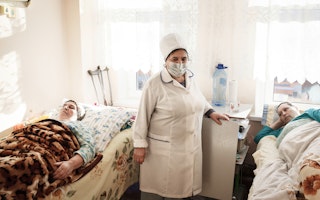A New Dawn for Pain Relief in Ukraine: Access to Oral Morphine
By Victoria Tymoshevska & Faith Mwangi-Powell
When his pain became unbearable, Vlad Zhukovsky pleaded for a stronger dose of pain medication. But because of severe Ukrainian regulations on morphine, the doctors could offer him no more. Unable to withstand the agony of his brain cancer he tried to jump out of a hospital window, but a fellow patient held him back. “He wanted to fall head-first to be killed right away to stop the torture. That’s how much his head hurt,” his 50-year-old mother Nadezhda said sobbing. “He howled like a wolf.”
The regulations on opioid painkillers that kept Vlad in unbearable pain are vestiges of Soviet-era restrictions and a government campaign to fight illegal drug use. They are among the strictest in the world. In most other countries, patients receive morphine in tablet or liquid form and are able take it themselves. In Ukraine it has only been available in injectable form, administered by a professional nurse.
But a new dawn has broken in Ukrainian for those suffering like Vlad. On February 1, the minister of health signed Order 77, which includes morphine tablets among other essential medications. This policy will—for the first time—allow the production and distribution of oral morphine to patients with severe and moderate pain resulting from illnesses such as cancer and AIDS.
The benefits of being able to take morphine orally are many. It avoids additional pain and complications from injection like inflammation and infection. It’s easier to intake for patients who—emaciated by cancer or other diseases—have no safe or accessible injection sites on their bodies. It also helps to avoid gaps in pain relief caused by the length of time between home visits by nurses: Morphine is only effective for about four to six hours, but nurses usually can only visit twice a day. And it helps offer a measure of freedom to patients to make daily plans (like taking children to school, buying groceries, visiting friends and family) without having to schedule around nurse visits.
The minister of health signed the order in response to years of advocacy pressure mounted by several Ukrainian stakeholders including the Open Society foundation in Ukraine and Open Society Foundations (OSF) grantee the Ukrainian League of Palliative and Hospice Care, and with international support from OSF grantees, Pain and Policy Studies Group, World Palliative Care Association, European Association for Palliative Care, and Human Rights Watch. In addition, local activists and the Open Society foundation in Ukraine convinced a local pharmaceutical company, Interchem, to produce the tablets locally. This ensures an adequate supply, because no international companies would register oral morphine in Ukraine, where heavy regulations result in lower profits.
This policy change is a significant first step towards adequate access to pain relief in Ukraine, but much work remains. The allowed daily dose of morphine is still limited to 50 milligrams—much less than cancer patients and others suffering from acute pain usually require, resulting in needless suffering. In addition, we must educate clinicians, law enforcement, and even government officials about the change so that doctors can prescribe morphine without fear of punishment.
But for now, there is real hope for those who suffer as Vlad Zhukovsky did.
Victoria Tymoshevska is director of the International Renaissance Foundation’s Public Health Program.
Until August 2013, Faith Mwangi-Powell was the senior program officer for global advocacy with the International Palliative Care Initiative.


